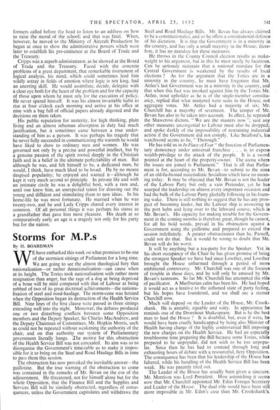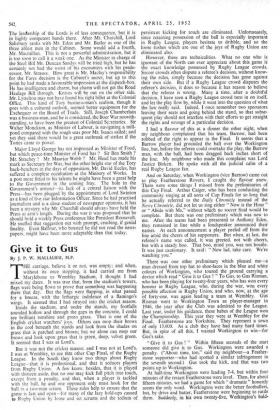Storms for M.P.s
By H. BOARDMAN WE have embarked this week on what promises to be one of the stormiest sittings of Parliament for a long time. We are going to see the almost theological fury that nationalisation—or rather denationalisation—can cause when at its height. The Tories took nationalisation with rather more resignation than anger, but the rage of a dog at being deprived of a bone will be mild compared with that of Labour at being robbed of two of its great doctrinal achievements—the nationa- lisation of steel and road-haulage. The storm-cone was hoisted when the Opposition began its destruction of the Health Service Bill. Nine lines of the first clause were passed in three sittings extending well into the night. Moreover, the debates produced one or two disturbing conflicts between some Opposition members and the Deputy Speaker, Sir Charles MacAndrew, and the Deputy Chairman of Committees, Mr. Hopkin Morris, such as could not be repeated without weakening the authority of the chair, and on that authority our system of Parliamentary government literally hangs. .The motive for this obstruction of the Health Service Bill was not concealed. Its aim was so to disorganise the Government's time-table as to make it impos- sible for it to bring on the Steel and Road Haulage Bills in time to pass them this session. The obstruction has now provoked the inevitable answer—the guillotine. But the true warning of the obstruction to come was contained in the remarks of Mr. Bevan on the eve of the adjournment. He threatened, not for himself alone but for the whole Opposition, that the Finance Bill and the Supplies and Services Bill will be similarly obstructed, regardless of conse- quences, unless the Government capitulates and withdraws the Steel and Road Haulage Bills. Mr. Bevan has always claimed to be a constitutionalist, and so he offers a constitutional defence of his dictation. It is that the Government is in a minority in the country, and has only a small majority in the House; there- fore, it has no mandate for these measures.
He throws in the County Council election results as make- weight to his argument, but in this he must surely be facetious. Can he seriously maintain that a national mandate for the Central Government is weakened by the results of local elections ? As for the argument that the Tories are in a minority in the country, he must have forgotten that Mr. Attlee's last Government was in a minority in the country, and that when this fact was invoked against him by the Tories Mr. Attlee, stout upholder as he is of the single-member constitu- ency, replied that what mattered were seats in the House, not aggregate votes. Mr. Attlee had a majority of six; Mr. Churchill has a majority of seventeen. The temper of Mr. Bevan has also to be taken into account. In effect, he repeated the Shawcross dictum, " We are the masters now "; said any other measures uncongenial to Labour must also be dropped; and spoke darkly of the impossibility of restraining industrial action if the Government did not comply. Like Stratford's, his watchword seems to be, " Thorough."
He has told us in In Place of Fear " the function of Parliamen- tary democracy under universal franchise . . . is to expose wealth-privilege to the attack of the people. It is a sword pointed at the heart of the property-owner. The arena where the issues are joined is Parliament." That is all that Parlia- ment is for, according to Mr. Bevan—to submit to the aims of an old-fashioned materialistic Socialism which have no mean- ing today. It may be objected that Mr. Bevan is not the leader of the Labour Party but only a vain Pretender, yet he has usurped the leadership on almost every important occasion and had the bulk of the Labour Party gleefully following in his foam- ing wake. There is still nothing to suggest that he has any pros- pect of becoming leader, but the Labour ship is answering to the port helm and lying over to the leftward course, which is Mr. Bevan's. His capacity for making trouble for the Govern- ment in the coming months is therefore great, though he cannot. for all his bold words, prevail in his obstruction against a Government using the guillotine and prepared to extend the session indefinitely. A greater obstructionist than he, Parnell, could not do that. But it would be wrong to doubt that Mr. Bevan will do his worst.
It will be anything but a tea-party for the Speaker. Yet in his.short occupancy of the Chair he has given promise of being the strongest Speaker we have had since Lowther, and Lowther brought the House unharmed through a period of more embittered controversy. Mr. Churchill was one of the focuses of trouble in those days, and he will only be amused by Mr. Bevan's tantrums. So far Mr. Churchill has attempted the role of pacificator. A Marlburian calm has been his. He had hoped it would act as a lenitive to the inflamed state of party feeling. but his hopes have foundered, and we shall see a sterner Churchill now.
Much will depend on the Leader of the House, Mr. Crook- shank. He is amiable, equable and witty. In appearance ho reminds one of the Droeshout Shakespeare. But is he the best man to lead the House ? It is doubtful, but, even if were, ho would have been cruelly handicapped by being also Minister of Health having charge of the highly controversial BilLimposing the new charges on the Health Service. He had an especially troublesome time preparing the Bill because some Tories, while prepared to be unpopular, did not wish to be too unpopu- lar. Since then he has had to contend through long and exhausting hours of debate with a resourceful, fiery Opposition. The consequence has been that his leadership of the House has faltered, while his handling of the Health Service Bill has been weak. He was patently tired out. The Leader of the House has usually been given a sinecure. Mr. Morrison was Lord President. How astonishing it seems now that Mr. Churchill appointed Mr. Eden Foreign Secretary and Leader of the House. The dual role would have been still more impossible in Mr. Eden's case than Mr. Crookshank's. The leadership of the Lords is of less consequence, but it is in highly competent hands there. After Mr. Churchill, Lord Salisbury ranks with Mr. Eden and Mr. Butler as one of the three ablest men in the Cabinet. Some would add a fourth, Mr. Macmillan. This is not a powerful administration, but it is too soon to call it a weak one. As the Minister in charge of the Steel Bill Mr. Duncan Sandys will be tried high, but he has certainly not had the worst of his encounters with his prede- cessor, Mr. Strauss. How great is Mr. Maclay's responsibility for the Fares decision is the Cabinet's secret, but up to this point he had made a favourable impression at the dispatch-box. He has intelligence and charm, but charm will not get the Road Haulage Bill through. Knives will be out on the other side. Mr. Lyttelton may not have found his right billet at the Colonial Office. This kind of Tory business-man's realism, though it goes with a cultured outlook, seemed better equipment for the Exchequer or the Board of Trade. Still, Joseph Chamberlain was a business-man, and he is considered, the Boer War notwith- standing, to have been the greatest of Colonial Secretaries. Sir Walter Monckton, as Minister of Labour, is navigating a mill- pond compared with the rough seas poor Mr. Isaacs sailed; and yet they said there would be a great outbreak of strikes if the Tories came to power.
Major Lloyd George has not impressed as Minister of Food, but which peace-time Minister of Food has ? Sir Ben Smith ? Mr. Strachey ? Mr. Maurice Webb ? Mr. Head has made his mark as Secretary for War, but the other bright star of the Tory back-benchers in the days of opposition, Mr. David Eccles, has suffered a complete occultation at the Ministry of Works. In a post more fitted to his talents he might have been a great help to the Government in the coming fray. The hole in the Government's armour—its lack of a central liaison with the Press—has been plugged by the appointment of Lord Swinton as a kind of five star Information Officer. Since he had practised journalism and is a close student of newspaper opinions, it has been a mystery why Mr. Churchill should always have held the Press at arm's length. During the war it was proposed that he should hold a weekly Press conference like President Roosevelt. He snuffed that suggestion out with prompt, crushing, if genial finality. Even Balfour, who boasted he did not read the news- papers, might have been more adaptable than that today.



































 Previous page
Previous page